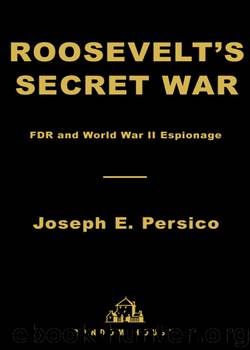Joseph E. Persico by Roosevelt's Secret War: FDR;World War II Espionage

Author:Roosevelt's Secret War: FDR;World War II Espionage
Language: eng
Format: mobi
Tags: Nonfiction
ISBN: 9781588361240
Publisher: Random House Publishing Group
Published: 2001-11-06T06:00:00+00:00
Chapter XVIII
Distrusting Allies
IT WAS the premier secret of the war. The President had personally cautioned physicist Robert Oppenheimer to guard zealously what was happening in the barren wastes of New Mexico. Still, the Germans, imagined rivals in the race for an atomic bomb, appeared to be evidently on to something. The intelligence chief of the Luftwaffe, Josef Schmid, had written a colleague eight months before the Manhattan Project was formally launched: “As far as it is known, work in the field of nuclear physics is already so far advanced, especially in the United States, that if the war were prolonged it could become of considerable significance.” Schmid added, “It is therefore desirable to acquire through the Abwehr additional information about American plans and the progress made in the United States in the field of nuclear research.” The Abwehr agreed to a plan to infiltrate a spy into the United States, “preferably a physicist.” The candidate settled on was Walter Koehler, a man of mixed strengths and weaknesses. As for shortcomings, Koehler was no physicist, but rather a jeweler by profession, with a rusty degree in engineering. His knowledge of nuclear science barely exceeded that obtainable in a course in Physics 101. Nor was Koehler’s past unblemished. He had once served six months in prison for stealing a friend’s briefcase containing six thousand guilders. But Koehler did have strengths. He was a Dutch citizen and a Catholic, two good covers for a person fleeing Europe as a presumed refugee from Nazism. He had relevant experience, having spied for Germany in the First World War. And Koehler, who had lived in New York until June 1941, knew America well. Just as helpful, he did not remotely resemble anyone’s image of a spy. He was fifty-seven years old, squat, overweight, and shy, with watery blue-gray eyes squinting behind glasses as thick as a bottle. When he smiled he exposed rotting teeth with the front two missing. Koehler was briefed by the Abwehr on his assignment—to find out the processes used in the production of uranium, any raw materials used in related processes, and where American nuclear scientists conducted their research. His first stop en route to the United States was Madrid, where, posing as an anti-Nazi refugee, Koehler was to apply for an entrance visa from the American consulate. Instead of hearing still another story of fear and oppression, the young consular official who handled this servile and inconspicuous applicant gasped at what Koehler told him. He said nothing at all about being a refugee. Instead, Koehler told the official that he was supposed to be going to America to spy for the Abwehr. To validate his story, he opened a battered suitcase and dumped onto the astonished American’s desk a kit for assembling a wireless radio, a codebook, and a camera for microfilming documents. He had accepted the Abwehr assignment, he explained, only to get out of Germany. He was ready to work, not for the Nazis, but against them. His offer was radioed ahead to the FBI, which took an instant interest in Walter Koehler.
Download
This site does not store any files on its server. We only index and link to content provided by other sites. Please contact the content providers to delete copyright contents if any and email us, we'll remove relevant links or contents immediately.
| Africa | Americas |
| Arctic & Antarctica | Asia |
| Australia & Oceania | Europe |
| Middle East | Russia |
| United States | World |
| Ancient Civilizations | Military |
| Historical Study & Educational Resources |
The Radium Girls by Kate Moore(12017)
100 Deadly Skills by Clint Emerson(4920)
Rise and Kill First by Ronen Bergman(4778)
The Templars by Dan Jones(4681)
The Doomsday Machine by Daniel Ellsberg(4484)
The Rape of Nanking by Iris Chang(4202)
Killing England by Bill O'Reilly(3995)
Stalin by Stephen Kotkin(3956)
Hitler in Los Angeles by Steven J. Ross(3942)
12 Strong by Doug Stanton(3541)
Hitler's Monsters by Eric Kurlander(3328)
Blood and Sand by Alex Von Tunzelmann(3194)
The Code Book by Simon Singh(3177)
Darkest Hour by Anthony McCarten(3119)
The Art of War Visualized by Jessica Hagy(3000)
Hitler's Flying Saucers: A Guide to German Flying Discs of the Second World War by Stevens Henry(2744)
Babylon's Ark by Lawrence Anthony(2671)
The Second World Wars by Victor Davis Hanson(2521)
Tobruk by Peter Fitzsimons(2507)
